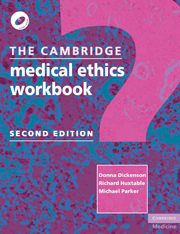Book contents
- Frontmatter
- Contents
- List of cases
- List of papers
- Preface to the second edition
- Preface to the first edition
- Cases in medical ethics and law: an interactive tutorial
- 1 Death and dying: decisions at the end of life
- 2 Reproduction: decisions at the start of life
- 3 Genetics: information, access and ownership
- 4 Medical research: participation and protection
- 5 Mental health: consent, competence and caring
- 6 Long-term care: autonomy, ageing and dependence
- 7 Children and young people: conflicting responsibilities
- 8 Resource allocation: justice, markets and rationing
- 9 Thinking about ethics: autonomy and patient choice
- Appendix 1 Study guide for teachers
- Appendix 2 Using keywords to explore this book
- Bibliography
- Index
6 - Long-term care: autonomy, ageing and dependence
- Frontmatter
- Contents
- List of cases
- List of papers
- Preface to the second edition
- Preface to the first edition
- Cases in medical ethics and law: an interactive tutorial
- 1 Death and dying: decisions at the end of life
- 2 Reproduction: decisions at the start of life
- 3 Genetics: information, access and ownership
- 4 Medical research: participation and protection
- 5 Mental health: consent, competence and caring
- 6 Long-term care: autonomy, ageing and dependence
- 7 Children and young people: conflicting responsibilities
- 8 Resource allocation: justice, markets and rationing
- 9 Thinking about ethics: autonomy and patient choice
- Appendix 1 Study guide for teachers
- Appendix 2 Using keywords to explore this book
- Bibliography
- Index
Summary
Introduction
Open any book on medical ethics and look at the contents page. Look at the front page of any national newspaper. In nearly all cases the focus will be on dramatic cases, crises situations or situations in which clinicians and families are faced with what are often called ‘ethical dilemmas’. Yet the day-to-day practice of medicine and healthcare more generally is not like this. One danger of this concentration on crises is that it creates the impression that medicine and healthcare is otherwise ethically unproblematic. Nurses, doctors and other healthcare professionals know that this is not the case. Many of the most difficult and, indeed the most interesting, ethical aspects of healthcare are those that arise in daily and long-term care. In this chapter we investigate ethical issues relating to long-term care, such as truth-telling and deception, confidentiality, the ethics of mealtimes and feeding, of mobility, the ethical difficulties raised by work with patients suffering from dementia, and dealing with intimate relationships between patients.
Truth-telling
The Case of Mr D
Sixty-eight-year-old Mr D, who has moderate dementia of the Alzheimer's type, lives at home with his wife. He is active and fit, which makes him quite demanding for Mrs D to nurse, given that he is also prone to wander and to forget where he lives. She welcomes the respite given by his attendance at a day-care centre, which he enjoys: he is very sociable. […]
- Type
- Chapter
- Information
- The Cambridge Medical Ethics Workbook , pp. 125 - 148Publisher: Cambridge University PressPrint publication year: 2010



